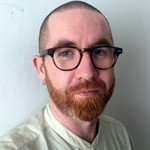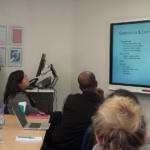|
Host Institute |
|
|
 |
Topic | Transformation of small-scale fishing communities. |
|
Supervisors |
Andrea Nightingale, Karen O’Brien |
|
| Secondment 1 | Island Institute | |
|
Mentor |
Rob Snyder, Suzanne MacDonald |
|
| Secondment 2 | Institute of Development Studies | |
|
Mentor |
Lyla Mehta, Lars Otto Naess |
|
| Fieldwork
|
Belgium and Scotland | |
|
Eoin Farrelly is a political scientist and peace scholar with research interests in climate change, food sovereignty, the transition to a post-growth economy, gender, masculinities and power. His PhD research will investigate the transformation of small-scale fishing communities in Scotland and Ireland. He has previously worked on LGBT Rights in Ireland, youth and community development in the north of England, and most recently as a programme assistant on a DfID and British Academy funded research project aimed at challenging simplistic narratives on brokerage in the migration sector. He holds a bachelor’s degree in Politics and Peace Studies from the University of Bradford and an MSc in Climate Change, Development and Policy from the University of Sussex and Institute of Development Studies. Tweets @eoinfarrelly83 |
||
Objectives of the research
The ESR will look at the global crisis in small-scale fisheries due to interconnected ecological and social processes. The focus will be on the pressures experienced by small-scale fishing communities due to the decline in European fish stocks, including the collapse of the in-shore herring fishery in Scotland, the decline in North Sea cod stocks, and a major collapse of Mediterranean fish stocks. Individual transferable quotas, which have been implemented in several EU countries, has led to the consolidation of fish industry in the hands of a few large boats/enterprises undermining the ability of local communities to sustain small-scale enterprises. The research will take a FPE look at efforts towards commoning in coastal communities including guilds that have taken their fishing quotas out of speculation markets and formed alternative markets, and labelling to source fish back to particular boats and fishing techniques. These community efforts will be examined in relation to networking activities such as that of LIFE (Low Impact Fishers of Europe) a lobbying organisation based in Brussels, the Inshore Fisheries Federation in Scotland, and Slow Fish (an international NGO group) and in particular how they have helped to support fisheries communities through sharing information and alternative marketing ideas.
Expected Results
The ESR will set out how efforts at commoning are able to help transform subjectivities and help to create a sense of community and commitment to collective fishing practices, as well as transform market rationalities to alternative ideas of sustainable livelihoods.
Progress update
Eoin moved his secondment from summer 2020 to spring 2021 so he could attend the rescheduled WEGO-ITN Learning Lab (latterly, this moved online due to COVID-19). He attended to the impacts of COVID-19 on the project, he made some progress by redesigning his research plan to build momentum in 2021. He managed to attend (online versions) of key networking events, notably Slow Food’s Terra Madre. The session focused on ‘Creel Food’ i.e., sea food caught using passive methods or diving, and explored the opportunities for re-localising markets with COVID-19 and Brexit happening. Alongside this event, he attended New Economics Foundation’s ‘Building a Caring Economy’ and ‘What should a Green Recovery look like?’. Although his progress is limited, how he responded to material changes has presented new writing opportunities, these are pipelined for 2021.
Publications by Eoin Farrelly
Forthcoming:
Blogs by Eoin Farrelly


